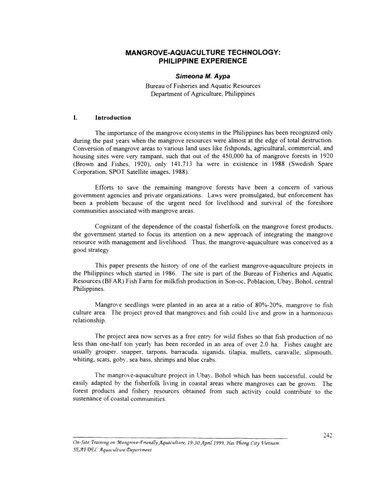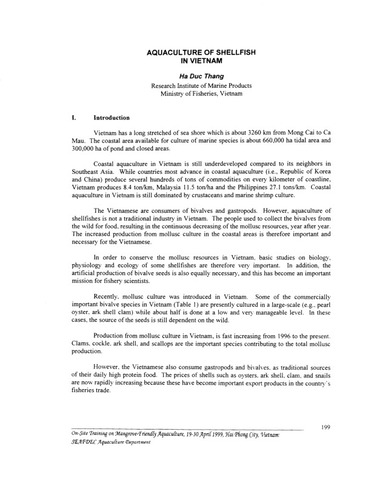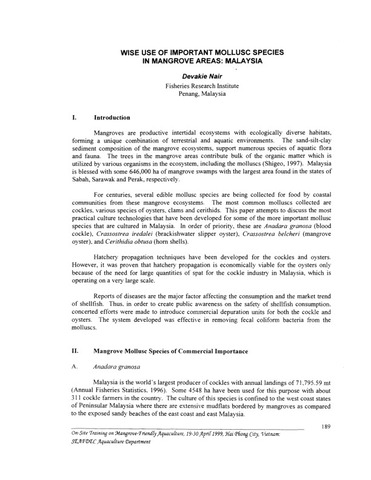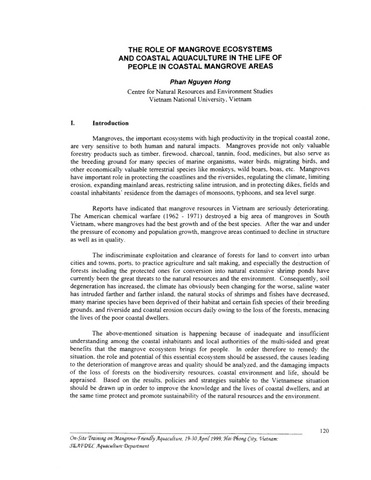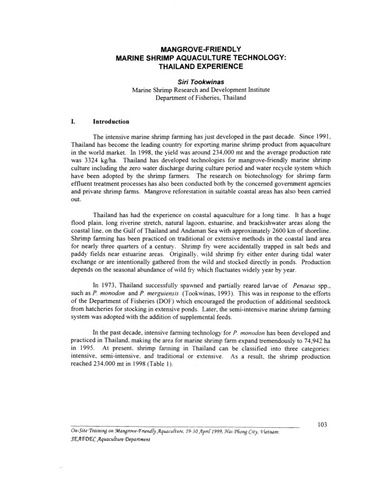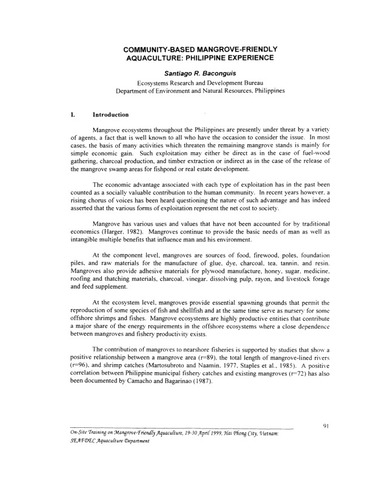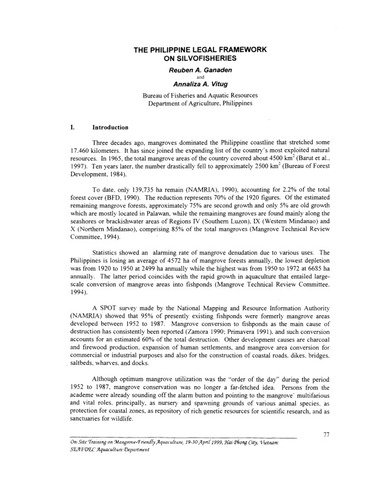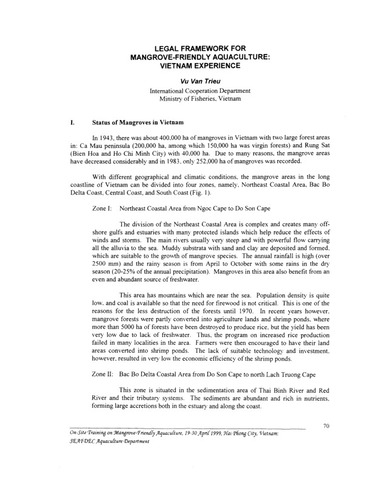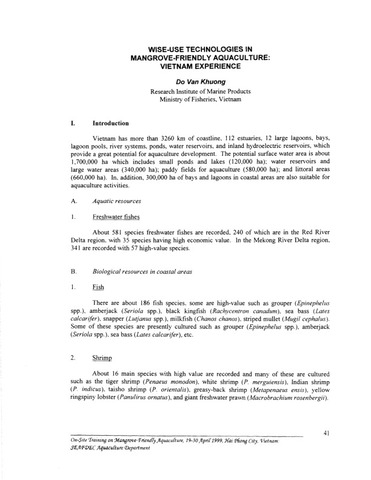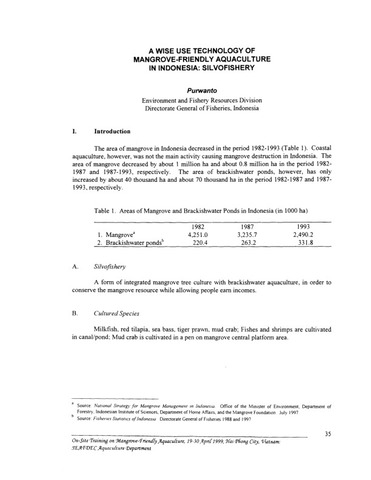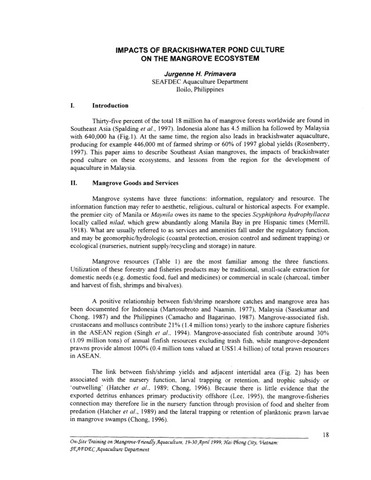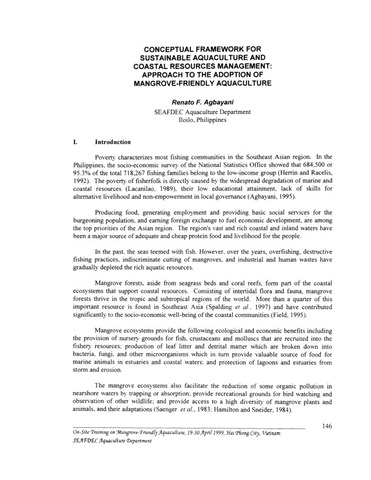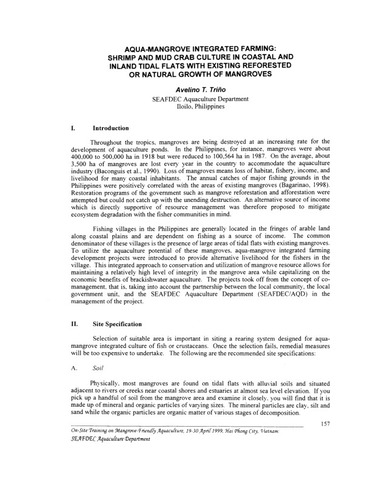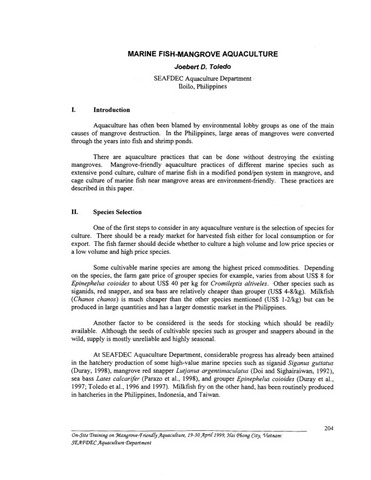Technologies in Mangrove-Friendly Aquaculture
Browse by
Recent Submissions
-
Technologies in Mangrove-Friendly Aquaculture. Final Report of and Papers Presented to the On-Site Training on Mangrove-Friendly Aquaculture, Hai Phong City, Socialist Republic of Vietnam, 19-30 April 1999
(Aquaculture Department, Southeast Asian Fisheries Development Center, 2000)This document contains the final report of and papers presented as lecture materials, to the On-Site Training on Mangrove-Friendly Aquaculture held in Hai Phong City, Socialist Republic of Vietnam from 19 to 30 April 1999. ... -
Mangrove-aquaculture technology: Philippine experience
(Aquaculture Department, Southeast Asian Fisheries Development Center, 2000)This paper presents the history of one of the earliest mangrove-aquaculture projects in the Philippines which started in 1986. The site is part of the Bureau of Fisheries and Aquatic Resources (BFAR) Fish Farm for milkfish ... -
Culture technologies for some economically important seaweeds
(Aquaculture Department, Southeast Asian Fisheries Development Center, 2000) -
Aquaculture of shellfish in Vietnam
(Aquaculture Department, Southeast Asian Fisheries Development Center, 2000) -
Wise use of important mollusc species in mangrove areas: Malaysia
(Aquaculture Department, Southeast Asian Fisheries Development Center, 2000)For centuries, several edible mollusc species are being collected for food by coastal communities from these mangrove ecosystems. The most common molluscs collected are cockles, various species of oysters, clams and ... -
The role of mangrove ecosystems and coastal aquaculture in the life of people in coastal mangrove areas
(Aquaculture Department, Southeast Asian Fisheries Development Center, 2000)In discussing the benefits from forests, usually only the direct products such as timber or other forestry products are counted. Little attention is made on indirect benefits such as climate regulation, erosion prevention, ... -
Mangrove-friendly marine shrimp aquaculture technology: Thailand experience
(Aquaculture Department, Southeast Asian Fisheries Development Center, 2000) -
Community-based mangrove-friendly aquaculture: Philippine experience
(Aquaculture Department, Southeast Asian Fisheries Development Center, 2000)This paper discussed two mangrove-friendly aquaculture technologies that will not only protect the coastal and mangrove ecosystem but could also increase the income of the coastal communities not only from the forest ... -
The Philippine legal framework on silvofisheries
(Aquaculture Department, Southeast Asian Fisheries Development Center, 2000) -
Legal framework for mangrove-friendly aquaculture: Vietnam experience
(Aquaculture Department, Southeast Asian Fisheries Development Center, 2000) -
Wise-use technologies in mangrove-friendly aquaculture: Vietnam experience
(Aquaculture Department, Southeast Asian Fisheries Development Center, 2000)This report refers to the status of aquaculture technologies in coastal areas in general. Some mangrove-friendly aquaculture systems in Vietnam are also discussed including several measures to develop aquaculture in mangroves ... -
A wise use technology of mangrove-friendly aquaculture in Indonesia: Silvofishery
(Aquaculture Department, Southeast Asian Fisheries Development Center, 2000) -
Impacts of brackishwater pond culture on the mangrove ecosystem
(Southeast Asian Fisheries Development Center, Aquaculture Department, 2000)This paper aims to describe Southeast Asian mangroves, the impacts of brackishwater pond culture on these ecosystems, and lessons from the region for the development of aquaculture in Malaysia. -
Conceptual framework for sustainable aquaculture and coastal resources management: Approach to the adoption of mangrove-friendly aquaculture
(Aquaculture Department, Southeast Asian Fisheries Development Center, 2000) -
Aqua-mangrove integrated farming: Shrimp and mud crab culture in coastal and inland tidal flats with existing reforested or natural growth of mangroves
(Aquaculture Department, Southeast Asian Fisheries Development Center, 2000)Throughout the tropics, mangroves are being destroyed at an increasing rate for the development of aquaculture ponds. In the Philippines, for instance, mangroves were about 400,000 to 500,000 ha in 1918 but were reduced ... -
Marine-fish mangrove aquaculture
(Aquaculture Department, Southeast Asian Fisheries Development Center, 2000)Aquaculture has often been blamed by environmental lobby groups as one of the main causes of mangrove destruction. In the Philippines, large areas of mangroves were converted through the years into fish and shrimp ponds. There ...


